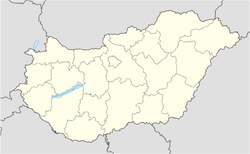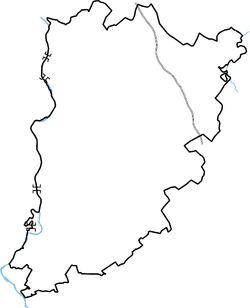| Main | Births etc |
|---|
| Solt German: Scholt Croatian: Šolta |
|||
|---|---|---|---|
| — City/város — | |||
| Vecsey mansion in Solt, at present the city's public library | |||
|
|||
| Location of Bács-Kiskun County in Hungary | |||
| Coordinates: | |||
| Country | |||
| Region | Southern Transdanubia Region | ||
| County | Bács-Kiskun County | ||
| Subregion | Kalocsa | ||
| First mentioned | 1145 | ||
| Government | |||
| • Mayor | Pál Kalmár (FIDESZ-KDNP) | ||
| Area | |||
| • Total | 132.67 km2 (51.22 sq mi) | ||
| Elevation | 98 m (322 ft) | ||
| Highest elevation | 105 m (344 ft) | ||
| Lowest elevation | 90 m (300 ft) | ||
| Population (1 Jan 2015) | |||
| • Total | 6 361 | ||
| • Density | 48.77/km2 (126.3/sq mi) | ||
| Time zone | CET (UTC+1) | ||
| • Summer (DST) | CEST (UTC+2) | ||
| Postal Code | 6320 | ||
| Area code | 78 | ||
| Website | http://www.solt.hu/ | ||
Solt (German: Scholt, Croatian: Šolta) is a city in Bács-Kiskun County, Southern Transdanubia Region, Hungary.
History[]
Early Solt[]
The region has been populated since the Stone Age. The results of diggings brought up Roman coins, weapons, and bodies. The road from the province of Pannonia to Dacia cut through Solt. The first written documents mentioning Solt date back to 1145. Solt was under the jurisdiction of the bishop of Kalocsa from the 11th until the 13th century.
Local legend[]
There is a local legend about the establishment of Solt. It is called the Legend of the Golden Key. According to the legend, Béla IV of Hungary gave two golden keys to the town of Solt for hiding him from the invading Mongolian tribes. The keys were hidden on top of the local Presbyterian church which was hit by lightning. The keys melted and were never found again. Since then they are only seen in the seal of the town.
Middle Ages[]
When Hungary was occupied by the Ottoman Empire, Solt lost much of its population. The town is mentioned many times during the Hungarian uprising against the Habsburgs; Francis II Rákóczi kept his army in the region.
In the second half of the 18th century, the North Hungarian nobility has purchased the town and the surrounding area. The castles of Baron Révay, Graf Berchtold, Graf Nemes, Graf Vécsey, Graf Benyovszky, Graf Czebrián, Graf Pongrácz, and the Graf Teleki family were built in the 19th century.
During the Revolution of 1848 Solt was an important camp of the Hungarian soldiers.
20th Century[]
Hungary lost both world wars which caused death and destruction in Solt. Afterwards, the country was occupied by the Soviet army and communism spread quickly. Finally, after 1989, Hungary regained her independence and Solt started to rise again. The town is now home to many independent businesses.
In the 1970s Transmitter Solt, a 2000 kW medium-wave broadcasting station, was built.
References[]
| |||||||||||||||||





